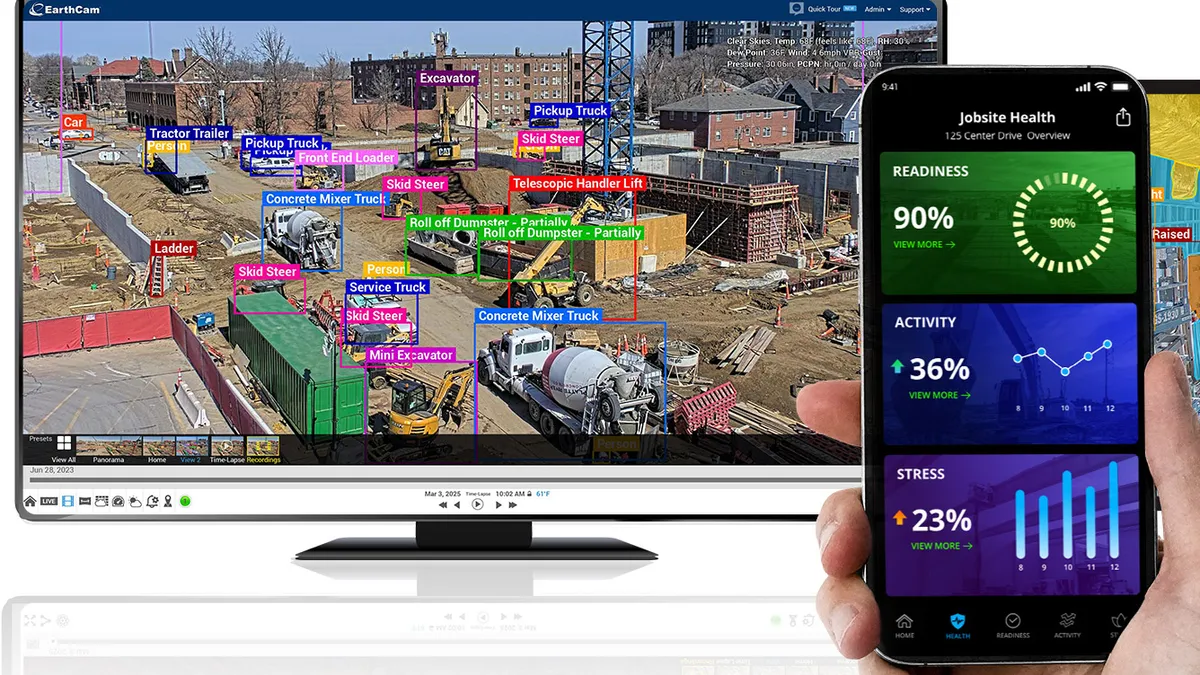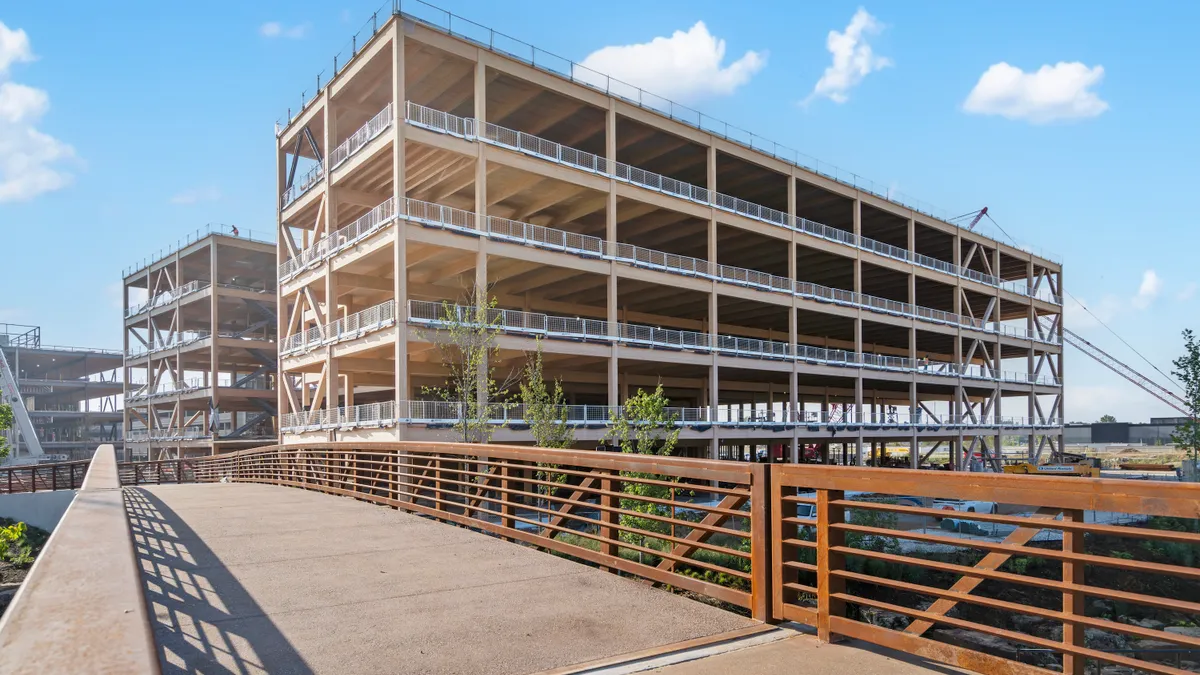The COVID-19 crisis has thrust construction technology into the spotlight. Contractors used tech to keep an eye on their jobsites and ensure work progressed according to schedule, while in-person office work halted. An array of startups developed novel solutions, some of which could become staples of construction documentation and management in the future.
As summer begins, here is a look at a few notable contech firms that received new funding this spring.
Avvir
Avvir, a New York City-based startup valued at $40 million, announced in late March it had raised $10 million in a funding round led by Trust Ventures, VentureBeat reported. Avvir uses laser scans and artificial intelligence to find and flag construction mistakes. The startup’s platform also updates BIM models to aid with monitoring construction progress.
Clients upload their BIM models to Avvir's portal where jobsite workers use mobile scanners on site to document 30,000 square feet an hour, even while construction is ongoing. Avvir's algorithms then compare the scans to the building plans to catch errors and delays, the startup’s site says. This then empowers contractors and other stakeholders to take corrective action in the field or push to update the plans.
Aclaimant
Aclaimant, a safety and risk management platform, announced in April it had raised $15 million in Series B equity and debt funding led by Next Coast Ventures, bringing the company's total funds raised to above $20 million. Using Aclaimant, clients can store information on safety incidents, digitize safety procedures and protocols, set up electronic incident and claim submissions, complete some required OSHA forms and visualize data and other valuable information.
Adam Rogers, former CEO of Ultimate Software, and previous investors Mercury Fund, KEX Ventures, Royal Street Ventures and Aspen Capital Group also participated in the round. The funding follows a year where Aclaimant reported its highest revenue, and increased system usage by 400%, according to the firm.
Briq
Financial software startup Briq announced earlier this month that it had raised $30 million in a Series B funding round led by Tiger Global Management. The funding brings the total Briq has raised to $43 million, Tech Crunch reported.
In April, Briq added to its platform with the release of BriqCash, the first construction payments and rewards platform focused on how contractors manage their expenses and cash. The product's features include expense and invoice automation; physical and virtual debit cards; virtual bank accounts; cost code and project-level expense permissioning and payment cards for project team and field employees.
Canvas
Construction robotics startup Canvas has raised $24 million in Series B funding led by Menlo Ventures, the company announced in April. The financing came with a strategic investment from Suffolk Construction, in addition to participation from Alumni Ventures Group and existing investors Innovation Endeavors, Brick & Mortar Ventures, Obvious Ventures and Grit Labs.
Canvas, which has developed robotics for drywall construction, was previously a finalist chosen by Suffolk's Boost program, where the contractor helps startups solve their challenges and expand their networks.
Extracker
Change order communication platform Extracker has announced it has raised $5.3 million in Series A funding with Jackson Square Ventures. The application aids contractors and subs in tracking change orders via automated organization, documentation and real-time visibility. Extracker includes change order logs, time and material tags, notifications and basic templates for rapid communication.
Extracker will use the new funding to scale its product and expand its team size, according to a release shared with Construction Dive.
Flexbase
Flexbase, an automated payment platform for contractors, announced in May $2.5 million in pre-seed fundraising. Suffolk Technologies was among the investors.
The startup aims to improve the speed of cash flow in the construction industry by enabling contractors to send invoices and paperwork to customers rapidly. On average, Flexbase claims, its customers get paid 63% earlier.
OpenSpace
Construction photo documentation and analysis startup OpenSpace announced in April it had received $55 million in Series C funding, led by Alkeon Capital Management. OpenSpace has seen its revenue triple and customer count increase by more than 150%, according to the announcement. Site captures also increased by 300% during that time.
The platform uses AI to create 360-degree photo representations of jobsites during regular walkthroughs. Workers attach a small camera to their hardhats and walk the site as normal, with OpenSpace passively capturing imagery in the background. Imagery data is then uploaded to the cloud, where algorithms map the photos to project plans and stitch them together, creating a visual representation of the site similar in style to Google Street View.
ToolBelt
On May 20, ToolBelt, a platform built to connect construction workers with employers, announced $2.5 million raised in a Series 2 round led by HR Tech Investments. Saint-Gobain, the French manufacturing company, also contributed to the round.
The Portland, Oregon-based startup focuses on residential construction, and can help contractors find highly skilled or general labor, as well as subcontractors or full-time employees. ToolBelt's growing presence in the Pacific Northwest, according to the announcement, is part of what prompted the investment.
Veev
Real estate development startup Veev — formerly known as Dragonfly Group — announced in March it had received $100 million in funding, bringing the total it had raised to $200 million. The funding came through a listing on TASE UP, an Israel-based digital platform for companies seeking capital from qualified investors who remain private.
Veev constructs single and multifamily homes, using modular prefabrication and streamlined design to deliver homes at a lower cost and four times faster than the industry standard, according to the release. The funding announcement followed the completion of a 78-unit emergency housing project in San Jose, California, which was finished in less than 90 days.
The company also recently introduced its Accessory Dwelling Unit model, a modular housing unit built on a lot of an existing primary home, as it continues to expand its footprint in California.






















